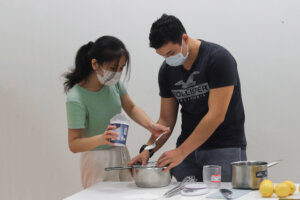- Two NTU clubs help students experiment with fermentation, with one focused on a variety of food and drink and the other more interested in alcoholic beverages.
- Students who have no experience with fermenting can try their hands at making foods like kimchi, sauerkraut, beer and mochi doughnuts.
- Fermentation involves a lot of uncertainty, but consistency and controlled environments are the secrets to success.
Text and photos by Colman Cheung
Metal bowls and sieves crowding the tables before them, the students in Crespion Hall’s Cultural Room stand in pairs: one gripping a fine mesh filter in their fingers, the other spooning yoghurt into sachets with the precision of a chemist. The 16 students, who come from various disciplines in NTU, are on their first step in making fermented lemonade — extracting whey from yoghurt.
The students are part of the Food Craft and Fermentation Club, one of two clubs in NTU that lets students try their hand at whipping up recipes such as kimchi, sauerkraut, beer and mochi doughnuts.

Members of the club pair up during the session to accommodate the large class size. (Photo credit: Colman Cheung)
Food fermentation is about creating the right conditions for bacteria to be processed in a natural way, said Michael Nguyen, a second-year Biological Science student. That might sound complicated, but the 20-year-old believes that fermenting is something anyone can try at home. He has conducted two fermentation workshops for the club to date.
Members typically do not have any previous experience in fermentation, but Michael has been an enthusiast since high school, when he studied biology in his home country of Vietnam. He most fondly recalls experimenting with various recipes to make sour cabbage, which he created together with his father.
While the students have their hands busy, Michael explains the science behind each step of the process. He believes this helps them better appreciate the activity, rather than blindly following a recipe.
“It’s easy to make a fermentation product. But how you make it consistent is a whole new area,” Michael said.
The next step for the 16 club members is to prepare 200ml of lemon juice. The participants squeeze the fruit into measuring cups, filling the room with a sharp, tangy aroma.
Shara Tay, 21, isn’t looking forward to tasting the fermented lemonade, a fizzy version of regular lemonade with a touch of sweetness. “I actually don’t like sour things,” said the Art, Design and Media student. “But I’m interested to learn.”
Shara is not new to fermenting her own food, having tried her hand at making sourdough bread at home. She joined the club to pick up more recipes like kombucha and cheese to widen her repertoire.
Others, like Ignatius Tan, 23, stumbled upon the club and fell in love with the craft of fermenting foods.
The self-described home cook joined the club because “food craft” was in the name, not realising that the club focused on fermentation and baking. However, inspired by the sessions, he has begun experimenting with fermentation at home.
NTU’s own Zymurgy club
As participants of the workshop wait patiently for the whey to drip into their metal bowls, bottles of cider and mead bubble beside a batch of freshly brewed beer in the basement pantry of the School of Chemical and Biomedical Engineering (SCBE), where students of SCBE Zymurgy Guild usually gather for their own fermentation sessions.
SCBE Zymurgy Guild is a club run by students that teaches the basics of beer brewing and the fermentation of kimchi, mead and cider. Zymurgy refers to the study and practice of fermentation in brewing, winemaking, and distillation.
The guild, which now has over 200 members, started as a beer brewing competition in 2018. Vice-chairperson Glenn Giam said the competition was organised by a former professor in SCBE as a fun way to help his students better understand his classes.
“The competition kept getting cancelled [due to Covid-19 restrictions], so I bought a fermentation kit out of spite,” Glenn, a Year 4 SCBE student, said.
He had no prior experience in fermentation and taught himself the craft by watching videos online.
The hardest part of fermentation, Glenn said, is the long waiting time. Unlike most cooking and baking, fermentation is a slow, gradual process, which adds uncertainty.
Brewing beer takes at least a week. It starts with soaking grains — namely barley, wheat, rice or oats — in water to extract fermentable sugar from them. The process, known as “all-grain brewing”, takes one day to complete and results in a porridge-like mixture called “mash”.
The guild skips this step and uses malt extract, the liquid collected from a mash, to simplify the process. Instead of starting from grains, club members simply stir malt extract into boiling water to form a “wort”.
The students then keep the wort in the guild’s own beer-making fridge to maintain the optimal temperature of the environment. It takes a week for the wort to ferment into beer, and two to three weeks for bottle conditioning, or carbonation, which produces bubbles in the beer.
Even the slightest changes in the environment can affect the outcome, Glenn said.
He recalled when he tried making beer with fruit as his first brewing experience. There was a harsh and pungent smell at the start, said Glenn, but after bottling and conditioning it, there were intense fruity notes of lychee and peach.
“It was a mind-blowing experience,” he said.



